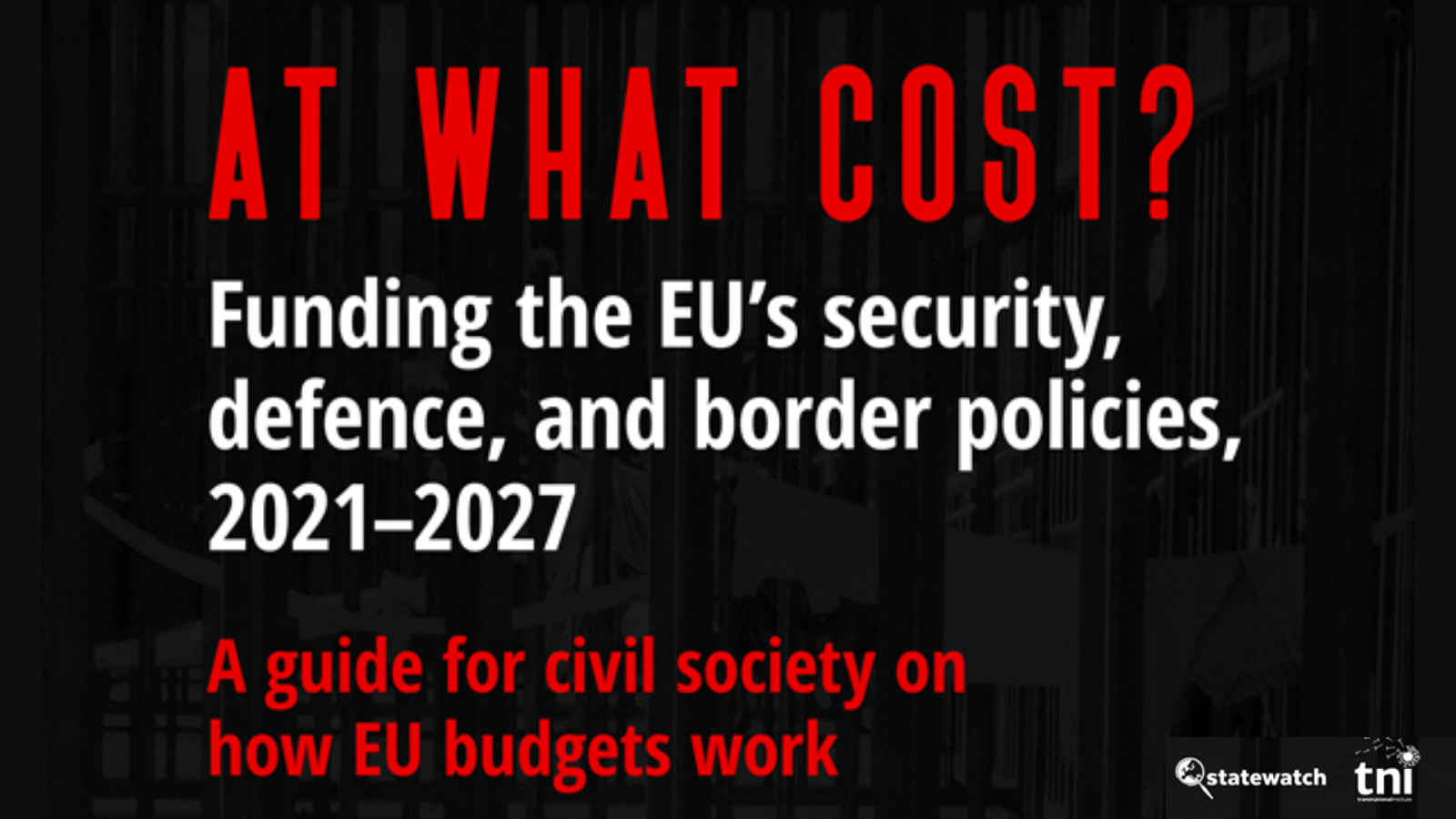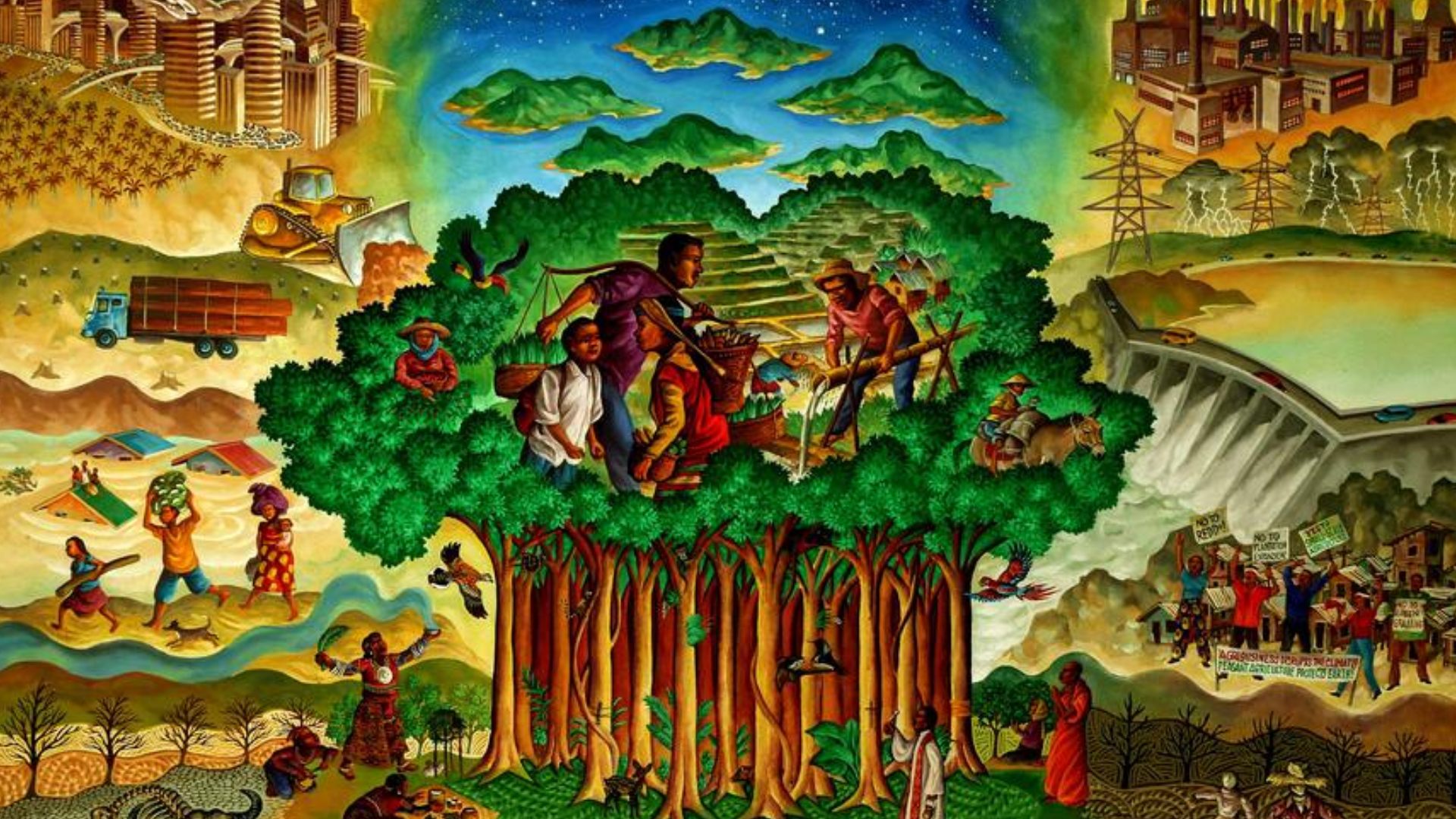|
Check out our new guide for civil society, activists, researchers and journalists gives an insight into how these budgets work
Was this forwarded to you? Sign up
here
|
|
Dear reader,
The answer is: The EU is to increase defence, security, and border spending by 123%.
The European Union's 2021–27 budget allocates an unprecedented €43.9 billion for security and defence purposes. The massive increase in security spending will strengthen 'Fortress Europe' and further externalise border control to third countries. The military budgets mark a new point of departure for the EU in pivoting towards hard power and militarism. Although the funding is being allocated for activities that carry significant risk, such as research into and development of lethal weapons, intrusive surveillance and policing, or the reinforcement of deadly border control practices, transparency, oversight, and accountability are all sorely lacking.

Our new guide for civil society, activists, researchers and journalists gives an insight into how these budgets work: eubudgets.tni.org.
|
|
|
Cannabis policy developments have arrived at an important moment where the treaty issue needs to be confronted in an honest manner, and not by hypocritical denials or fantasy interpretations that undermine basic principles of international law and cannot stand the scrutiny of ‘good faith’ treaty interpretation.
Read more
Former coca leaf farming neighbourhood in Nariño
This article focuses on the role that the Colombian state’s land titling programme has played in helping their communities substitute their illegal drug crops with legal alternatives. The author interviewed over 80 farmers in former coca leaf farming communities, in Putumayo, Caquetá, Cauca and Nariño, and carried out 30 elite interviews.
Read more
As conflict and crisis continue in the aftermath of the SAC coup, political instability and uncertainty have swept many parts of the country. In this commentary, Khun Say Lone examines a dramatic succession of events in Shan State that have seen the RCSS, an NCA-signatory, forced to retreat by other ethnic armed organisations in the territory. Amidst allegations of “divide and rule”, he argues that unity is needed if the people are to end the cycles of conflict and build a better future.
Read more
Interview with Nick Buxton by Nuria del Viso.
Read more
|
|
|
|
|
|
The Transnational Institute (TNI) is issuing an open call for essays, accessible papers, infographics and artistic collaborations on the theme of 'digital power' for its eleventh State of Power report to be launched in January 2023.
Deadline for pitch/proposal: 8 June 2022.
Find out more
Global Anti-War Forum - World Social Forum
TNI joined with global social movements and networks at the World Social Forum, which took place in Mexico City and online between 1 and 6 May 2022. In collaboration with several activists, scholars, and civil society organisations, we participated in a number of activities in the thematic frame – Peace Building, Migration and strategies addressing war.
You can watch back the recording of the Global Anti-War Forum in which participants analysed the state of permanent war and pacification of resistance around the world.
M2M Solidarity: Is there a culture of European solidarity?
Yes, if you look at the local level. Many local communities in Europe have transformed their context by experimenting with new forms of democracy.
Kronenberg (The Netherlands) and Cádiz (Spain) show us in this joint video series how different places in Europe fight against energy poverty and how such initiatives start. What is the role of civil society in implementing an energy transition in both places?
Watch the videos
In these videos made by Amsterdam City Rights and Next Planning in Grenoble, we explore the spaces and buildings that welcome them but also the ones that exclude them. Personal stories intertwined with urban structures convey a message of a shared problem of public spaces across Europe that has been heavily intensified with the pandemic.
Watch the videos
|
|
|
|
|
|

26-29 September 2022
13.00 – 15.30 CAT/ CET each day
Register here
From across a spectrum of scholarly and activist engagements, and in the lead-up to COP27, we seek contributions that speak to how we can build an anti-capitalist, trans-environmental and agrarian approach to confront climate change in rural settings. The conference programme is designed to foster dialogue and interaction across a spectrum of scholar and activist communities.

The session will unpack multistakeholderism in the health sector by connecting the dots between multistakeholder arrangements and the erosion of civil society’s participation in global health governance. It aims to inform and mobilise organizations and people with an interest in the WHO to deliberate on building a stronger democratic multilateral system accountable to the public interest and committed to a sustainable planet.
This webinar is part of People’s realities, determinants of health, democratic governance: Connecting dots outside the doors of the World Health Assembly, held 16-20 May 2022 and organised by Geneva Global Health Hub (G2H2) ahead of the 75th World Health Assembly.
|
|
|
|
|
|
|
|
Many poor countries sign trade agreements with the desperate hope of attracting investment from their wealthy counterparts. However, these agreements, or treaties, tend to have some very problematic clauses, which often lead to trouble down the road. Investors have used these treaties to sue countries for any actions, such as changes in policy, that they perceive to be a threat to their projected profits. And they don’t sue in the national courts either, but in a special parallel system that seems to always favour the foreign investors. Countries have had to use billions in taxpayer money, to pay these investors, at the expense of their own development.
Our guest on this episode of the podcast, Luciana Ghiotto is a researcher at TNI on trade and Investment. Her Phd is in social sciences, and she has done a lot of research on these Free trade agreements.
Subscribe to State of Power on
Spotify
,
TuneIn
or
AudioBoom
|
|
|
|
|
|
|
|
Todd Miller, Without Trump, the Border Is Still a Profitable Battlefield
For most Americans these days, our southern border with Mexico means just one thing: a political battlefield of the first order, Republicans versus Democrats, Us versus Them.
Read more
Our Global Food System Was Already in Crisis. Russia’s War Will Make It Worse
The Global South will suffer the most as colonial legacies, climate change, and capitalism continue to plunge millions into hunger.
Read more
Another perfect crisis
How the failure to reform food systems has allowed the war in Ukraine to spark a third global food price crisis in 15 years, and what can be done to prevent the next one.
Read more
The fossil fuel industry has a trillion-dollar secret weapon to kneecap climate action
International trade agreements open the door to claims that could slow progress on climate change.
Read more
|
|
|
|
|
|
|
| | | |